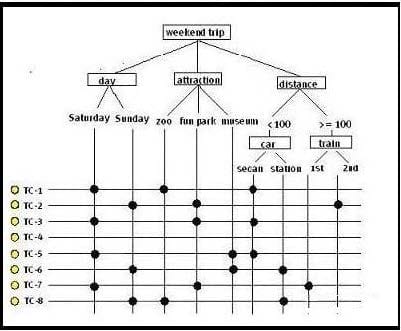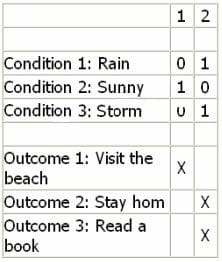EX0-113 Online Practice Questions and Answers
See the illustration below:
To test a registration application for a weekend trip, logical test cases must be created in accordance with the Data Combination Test. In addition, it has been agreed that less depth testing must be performed. One data pair has been defined that must be fully tested in combination:
-car - attraction
Eight test cases are designed using a classification tree.

Where must the 'bullets' for test case 4 be placed?
A. Saturday, fun park, 2nd
B. Sunday, museum, station
C. Sunday, fun park, station
A structured testing approach is characterized by:
-providing concrete footholds
-covering the full scope and describing the complete range of relevant aspects
-
providing a structure, so that it is clear what exactly by whom, when and in what sequence has to be done What is the fourth characteristic?
A.
it delivers insight into and advice on any risks in respect of the quality of the tested system managing test activities in the context of time, money and quality
B.
C.
the testing is on the critical path of the total development, as briefly as possible, so that the total lead time of development is shortened
D.
to find defects at an early stage
See the decision and test situations below:
R = (A AND B) OR C

Which test situation is missing if the coverage type decision points modified condition/decision coverage is used?

A. Option A
B. Option B
See the specification below:
IF A AND (B OR C)
THEN error message
ENDIF
How many logical test cases are distinguished if Semantic Testing with coverage type decision points condition/decision coverage is used?
A. 2
B. 3
C. 4
D. 8
What is to be preserved in the activity reserving the testware? What is to be preserved in the activity?
A. all testware created during the project
B. a selection of the testware in consultation with the future administrator
What is an advantage of the BDTM approach?
A. a test process that can be controlled by the client
B. a cheaper test process
C. a risk-free production launch of the tested system
Problems can be prevented by looking closely at the way the starting point for the test execution must be structured and which process must be deployed when using it. Which problem does this not prevent?
A. production disruptions
B. a deteriorating starting point
C. testing gets increasingly expensive
What is the definition of valuation?
A. Evaluation gives insight in the actual and future status of the end product.
B. Evaluation is a process that gives insight into and advice on quality and related risks.
C. Evaluation is assessing the interim products in the system development process.
During which TMap phase is testing 'dynamic implicit'?
A. Specification
B. Execution
C. Preparation
During the test execution of a large customer registration system, the system went down for several times. Although there were no test cases described the tester concluded that the continuity was poor. Which testing method is described here?
A. dynamic explicit testing
B. dynamic implicit testing
C. static testing
See the specifications below:

How many test situations are generated if the coverage type decision points with decision coverage (as part of the elementary comparison test) is used?
A. 3
B. 4
C. 6
D. 8
What is a major reason for evaluating the test basis during the preparation phase?
A. Avoiding costly corrective work at a later stage of the project.
B. Being able to design the test infrastructure at an earlier stage.
C. Being able to build test data quickly.
During testing, a record is kept of the amount of effort (in hours) required in order to resolve an error. Which quality attribute does this provide insight into?
A. The flexibility of the information system.
B. The maintainability of the information system.
C. The performance of the information system.
D. The testability of the information system.
In which field of an defect report can it be useful to make a distinction between the tester and the decision forum?
A. Author
B. Cause
C. Priority
D. Test specification
See the decision table below:

Which coverage type has been used to create the decision table?
A. Decision points condition/decision coverage
B. Decision points modified condition/decision coverage
C. Decision points multiple condition coverage
